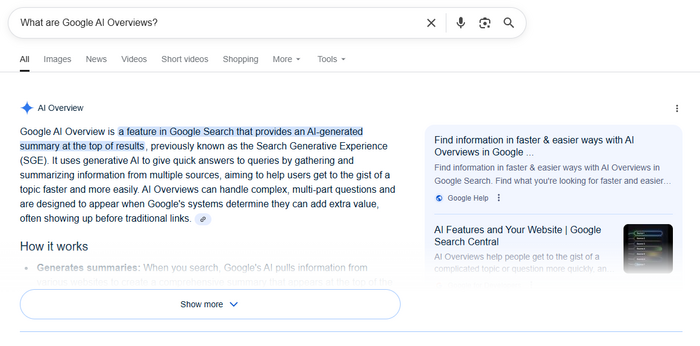How to Optimise Your Website for AI Search
From the Journal – Posted 24.10.2025

AI search is changing how people discover and consume content online.
The status quo is shifting. Instead of relying solely on Google’s ten blue links, users are turning to tools like ChatGPT and Perplexity to find and interpret information.
And now, with Google’s AI Overviews rolling out more widely, even traditional search results are being reshaped. Rather than simply listing pages, Google’s AI summarises the web, pulling together insights from multiple sources to create one coherent answer.

While early data suggests users are complementing Google searches with AI queries rather than replacing them, the search landscape is developing rapidly and meaningfully.
Your website isn’t just competing for rankings anymore; it’s competing to be understood by AI systems that read, summarise, and recommend content in new ways.
The good news? The fundamentals of search still apply. Intent hasn’t changed. Users still value clarity, expertise, and authenticity. Instead, how you present that information matters more than ever.
Below, we’ll explore what AI search means for your website, how it changes SEO, and the practical steps you can take to stay visible and valuable in this new search landscape.
💡Further reading: Should I Use ChatGPT to Write my Website Content?
What is AI search, and why does it matter?
AI search is a paradigm shift in the search experience.
Instead of typing a short query into Google and being presented with a list of blue links, AI search tools interpret your intent, synthesise information from multiple sources, and deliver a conversational, personalised answer accompanied by a list of citations
Traditional search engines index pages and rank them based on signals like keywords, backlinks, and site authority. AI-powered tools like ChatGPT, Perplexity, and Google’s AI Overviews go further; they understand and summarise your content to generate cohesive responses.
This means:
- Your site might not appear as a clickable result but rather as a source within an AI-generated answer.
- Clear, well-structured content becomes even more important, since AI models rely on readability and context to surface information.
Brand visibility in AI search depends on being summarisable; if the AI can easily explain your page, it can easily recommend it.
How AI search changes traditional SEO
Despite what some are saying online, AI search doesn’t replace SEO. Like we said above, intent hasn’t changed. SEO is not dead; it’s adapting.
Nick Livermore, Marketing ManagerRumours of the death of SEO have been greatly exaggerated. AI search may be changing, relatively quickly, how people discover information, but it’s a case of evolution, not extinction. The fundamentals of search remain important - don’t lose sight of them.
People still want clear, trustworthy, and useful answers. What’s changing is how those answers are discovered and delivered.
At its core, SEO has always been about helping people (and machines) understand your content. That remains true. The difference now is that AI systems interpret meaning, not just match keywords. Context, structure, and credibility matter more than ever.
💡 Don't miss our guide to building a website that ranks in 2026...
What’s still the same: the SEO fundamentals
We’ve already shared a comprehensive guide to building a website that ranks. But in short, strong technical foundations still underpin search performance.
You still absolutely need to consider:
- Core Web Vitals & site speed
- Accessible, mobile-first design
- Navigation and site architecture
And, of course, Google’s E-E-A-T (Experience, Expertise, Authoritativeness, Trustworthiness) still guides quality evaluation. Ultimately, all of these tools want to deliver users the best possible content.
What’s evolving: AI search visibility
All that said, SEO is evolving. Instead of chasing algorithms, you’re now optimising for understanding. SEO best practice still applies, but there are also plenty of things changing:
Conversations, not keywords
Search engines and LLMs are now looking for content that answers real questions in a natural way. Creating content with that in mind makes it far more likely to be cited or summarised.
This means writing more humanly. Think about how your audience talks. Use language that mirrors genuine questions, answers, and conversation. Think beyond simple search terms.
Recognition, not ranking
Search success is no longer predicated solely on where and how frequently you appear, but also on how the expertise you bring to the table is recognised and referenced.
Tools like ChatGPT look at and summarise multiple credible sources. The clearer and more consistent your content, the more likely it is to be cited.
Trust, not clicks
Traditional SEO - the ten blue links - was all about clicks. AI search is about trust. LLMs surface content that is confident, original, and genuinely helpful.
This has always been important, but avoiding thin, recycled content is more important than ever. You need to stand out with excellence and invest in substance and unique viewpoints if possible.
How to make sure your website is AI search-ready
We’ve established that traditional SEO is about making sure you’re found, and AI search is about making sure you’re understood. But, at the end of the day, the goal remains the same: reach the right audience with content they find useful.
Nick Livermore, Marketing ManagerAlways write for your customers. It’s what they want and, as a consequence of that, it’s what Google wants, it’s what OpenAI wants. Keyword stuffing has long been consigned to the rubbish heap, but if you thought it wasn’t already, it should be now. Write for humans. Write to be helpful.
How you present that information and position it for discovery matters more than ever. With that in mind, here are a few practical steps you can take to make your website readable, reliable, and useful to both humans and AI.
Below, we break this down into 5 focus areas:
1. Structure content clearly
AI tools - and humans, for that matter - thrive on clarity. They need to be able to easily recognise what each page is about and how your information fits together. It all sounds so simple and obvious on the face of it, but many fall at this hurdle. For starters…
- Use clear headings and subheadings (H1, H2, H3) that mirror natural questions and logical themes.
- Lead with concise summaries - these are memorable and quotable - then unpack the details.
- Implement schema markup (FAQ, Article, HowTo, Product) where relevant; this helps AI interpret context, not just words.
For example, adding FAQ schema to a service page can help AI tools understand not just what you do, but how you talk about it.
A good way to approach all of this is to think of your content as structured data, not just words on a page. The clearer your layout and semantics, the easier it is for AI systems to read, summarise, and cite it accurately.
💡Further reading: The Role of Schema Markup in SEO and AI Search
2. Strengthen expertise and trust signals
Systems like LLMs assess content quality in much the same way Google does. Working according to its E-E-A-T framework - Experience, Expertise, Authoritativeness, and Trustworthiness - isn’t a bad place to start.
As a starting point:
- Attribute content to real authors with short bios or credentials.
- Reference first-hand experience through project insights, data, or case studies.
- Maintain consistent brand trust cues; secure HTTPS, transparent policies, and accurate metadata.
- Keep content current: update older pages, refresh case studies and social proof, and remove outdated information where possible.
These elements help both search engines and readers recognise your credibility, and AI models rely on those cues when deciding what to reference.
3. Write for humans
There’s a trend emerging here, isn’t there? Put simply, when Google or LLMs crawl your website, they’re looking for evidence that your content is what humans are looking for.
Your users aren’t looking for keyword-stuffed copy. And this approach won’t help you appear in AI-generated summaries. Instead, write in plain, conversational language that answers questions directly.
- Use natural phrasing and sentence structures.
- Incorporate long-tail or question-based headings (“How does...”, “What’s the best way to...”).
- Focus on clarity and completeness; answer the whole question, and make your content as useful as possible.
- Avoid fluff and filler: AI models identify and downplay generic or repetitive content.
A good rule of thumb is to read back all your content - aloud if possible - and question whether it sounds like something a real person would say.
4. Keep your technical foundations solid
Much of search success depends on traditional crawlability and performance. AI search doesn’t change that. In short, even the best article ever written won’t be cited if search engines or LLMs can’t reach it. At a minimum…
- Prioritise speed and Core Web Vitals. Slow, frustrating pages get less visibility and are less likely to be used as training or reference material.
- Keep your sitemap.xml, robots.txt, and llms.txt up to date. These files signal what search engines and LLMs can crawl and cite.
- Ensure mobile accessibility and inclusive design. Clear structure, readable contrast, and compliance with accessibility standards strengthen your authority signals for both search engines and AI models.
💡Further reading: Our guide to technical SEO…
5. Build internal context
Good site structure has always been important. And it’s only becoming more so.
A good content strategy supports itself. The way your content interlinks emphasises your expertise and helps AI systems and users alike build a picture of the true depth of your knowledge. Internal linking isn’t just navigation.
- Link related content with clear, descriptive anchor text to reinforce relevance and intent.
- Build topic clusters that connect multiple articles around a core theme to demonstrate authority.
- Use breadcrumbs and structured navigation to make hierarchy obvious to both users and crawlers.
Pages are rarely evaluated in isolation, whether by AI models, Google, or your users. A coherent internal structure increases the likelihood of confident summarisation, citation, and inclusion in AI-generated answers.
The search principles remain the same
The more things change, the more they stay the same.
AI search is changing the landscape. But, to reiterate, your audience and their intent remain the same. And that means the principles of good digital strategy are unchanged.
Those who thrive will continue to be those focused on excellent content that’s genuinely useful, technically sound, and written with humans in mind.
If your website already prioritises clarity, structure, and credibility, you’re halfway there. The rest is about refinement and improvement, and making your expertise both easy to access and understand for humans and machines alike.